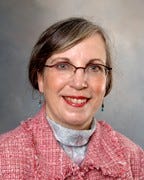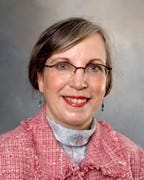(Dr. Cynthia Jones-Nosacek is retired after over 40 years as a family practice doctor. The mother of five children, she was interviewed by both ABC and the BBC for her pro-life testimony before the Wisconsin state legislature. This interview was completed in 2007.)
Kristen: How did you end up as a pro-life physician?
Cynthia: When I talked to my priest about these issues in the 1980s, he basically said Humane Vitae was optional. Not having a catechism back then, it never occurred to me to question him. And the medical profession as a whole is very anti-NFP.
Kristen: What changed your mind?
Cynthia: When we started putting our kids through religious classes, we were always told that doing confession before first communion was optional. But when the catechism came out [1992], I realized that some of the information I was getting from spiritual advisors was not quite in conjunction with the catechism.
And I had friends at Marquette University studying theology, like Dr. Mark Ginter. There was a lot more information available for Catholics, and I became curious what else was not optional.
Kristen: As a doctor, you already knew about natural family planning, right?
Cynthia: Actually, everything I learned about NFP initially was from one physician I knew in my residency days, or on my own. My husband and I had been using NFP for years. I knew it was good for myself, but at the time, I still felt that patients had to make their own decisions. I should go along as long as it didn’t include abortion. My witness changed because all contraception breaks the bond between fertility and pleasure, or as Dr. Janet Smith puts it, between babies and bonding.
Kristen: You work for a Catholic hospital. So, there wasn’t a problem there, right?
Cynthia: Yes, they already had at least one other trailblazer with an NFP only practice. But the cost to me was to lose so many obstetrics patients. I love delivering babies, and that part of my practice is now nowhere near to what it was.
Kristen: I understand you are a trailblazer in another respect. Your husband is a stay-at-home dad! Which was more radical, to have Gary stay home with the kids, or to become an NFP-only physician?
Cynthia: Oh, definitely the NFP-only physician was more radical! I even had a death threat after I appeared on the BBC for an interview. Someone wrote on Radio Satan or something that I should be shot. We found that website about six months to a year after the interview so the passage of time blunted the effect of the threat. Nothing happened.
Kristen: That’s a relief!
Cynthia: Especially to Gary!
Having Gary stay at home was the easiest thing we’ve ever done. In the early years, either one of us or my mother always watched the kids. He was in radio and advertising. There came a point that he could have worked tons more hours than I could and still make less than I was making. He’s been at home about a dozen years, and I think the kids see more of both of us.
Kristen: Lots of working women complain about the amount of time they spend on housework. How about you?
Cynthia: Oh, I don’t know. He does the laundry. I cook on my days off and weekends, do most of the baking and help with the cleaning. We have two married, one in college and two at home now, so it’s a little different. But he is able to be involved in their schools, fund raising and all that. One of us is almost always home, and available for their needs.
A child psychologist we know recommends that you try to stay home with teens rather than toddlers. It’s easier to find people to watch the toddlers, than to find people you can trust to keep an eye on the teens. They don’t need a babysitter, but a chaperone, and just someone to talk with.
Kristen: It’s clear that your public advocacy flows from your faith. How do you keep your prudence and your peace when you are “on the spot?”
Cynthia: I think it helps not to look at the other side as the incarnate of evil. My mother is extremely prochoice, radically so. We’ve had arguments but it doesn’t get into the nasty rhetoric. She sees women in pain and sees this as a way of easing their pain. The abortion providers I’ve talked to are not in it for the money. They think they are helping women.
And, I am careful to use terms we can all agree upon. When I testify, I never use the word conception because there are different definitions of that. So, I say, “post-fertilization effects.”
You need to have them listen. If the other side turns red at the very mention of a certain term, I am comfortable enough in conversation not to use that term.
Kristen: Do you think that Roe vs. Wade will ever be overturned?
Cynthia: Well, we are talking about an unborn human being. Our society has given the Supreme Court the right to determine which human beings are persons. In the past, the law has said that women didn’t exist except as property of their fathers or husbands. Once, the laws said that a black person was two-thirds of a human being. We’ve always let the courts decide how much of a person you are.
Ultimately, too, the law is saying that some human beings are more valued than other human beings. That is the underlying argument of abortion. Who makes that decision? It’s not the weak, the poor, the powerless. No, the strong, the healthy and the rich make that decision.
Kristen: It’s a justice issue as much as an ideological autonomy issue.
Cynthia: Right. Even if you’re saying she’s making her own decision, you are saying that this mother is more powerful than the baby, the person. We don’t ask the baby’s opinion, and the child has no say in the matter.





